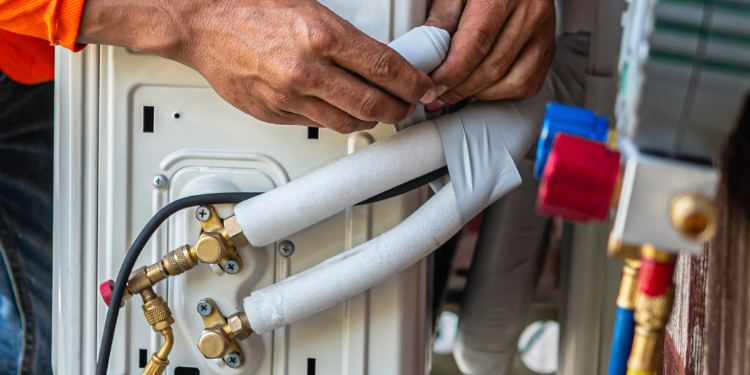A leaking hot water heater can quickly turn from a minor inconvenience into a major household disaster. Not only does it risk water damage to your home, but ignoring a leak can lead to expensive repairs or even the need for a complete replacement of your water heater. Knowing how to act quickly and address the issue can save you from unnecessary stress and cost. Understanding the early signs of a leak and when to call a professional are crucial steps for homeowners in Richardson, Texas.
Key Takeaway: If your hot water heater is leaking, it is important to take immediate action. By identifying the source of the leak and addressing it quickly, you can prevent further damage and costly repairs. Regular maintenance and monitoring your heater for signs of wear can extend its life and keep your home safe.
Recognizing Early Signs of a Water Heater Leak
Hot water heaters are integral to any home, but when they start to leak, the damage can be significant. There are a few early signs you should be aware of to avoid further problems.
Leaks Around the Base
One of the first signs of a problem is often a small pool of water at the base of the heater. This can indicate a leak in the tank itself or an issue with the connections. While small, this leak can escalate quickly if ignored. It’s important to regularly inspect your water heater and the area around it to catch these issues early. A slow leak can lead to rust or corrosion, further weakening the tank.
Temperature Fluctuations
Another indicator of a potential leak is irregular water temperature. If your water fluctuates between hot and cold or you’re experiencing reduced hot water, this could mean the heater is struggling to maintain its function due to a leak or damage. These fluctuations can also cause the system to overwork itself, leading to more wear and tear. Addressing this issue early on can help extend the life of your heater.
Rusty Water
When you notice rusty or discolored water coming from your faucets, it may be a sign that your hot water heater’s tank is corroding. While corrosion itself is a serious problem, it can also cause leaks over time, as the rust weakens the structure of the tank. Regularly inspecting for rusty water can help you detect and address issues before they worsen.
The Importance of Immediate Action
Acting fast when you notice a leak is crucial for preventing further damage and avoiding costly repairs. Many homeowners may think a small leak isn’t a big deal, but it can quickly escalate.
Preventing Water Damage
Even a small, slow leak can cause significant water damage over time. It can seep into floors, walls, and nearby appliances, leading to mold growth and structural damage. Immediate action, such as shutting off the water supply and calling a professional, can save you from more extensive damage. Regular inspections can help prevent these situations from escalating.
Avoiding Expensive Repairs
The longer a leak is left unattended, the higher the chance that repairs will be costly. Small leaks can turn into larger ones, requiring more intensive repairs or even a full water heater replacement. Keeping an eye on your water heater’s performance and scheduling regular maintenance can help you avoid expensive repairs down the line. For homeowners in Richardson, Texas, calling a local expert like Casto Leak Detection can be a crucial step in preventing damage.
Saving Energy
Leaks can also cause your water heater to use more energy, as it struggles to maintain water temperature. This not only increases your energy bill but also places more stress on the unit, shortening its lifespan. Fixing leaks promptly ensures that your heater operates efficiently, saving you money in the long run.
Common Causes of Hot Water Heater Leaks
Understanding the causes of hot water heater leaks can help homeowners prevent future issues.
Age of the Heater
One of the most common causes of leaks is simply the age of the heater. Over time, wear and tear take their toll on the tank and its components. Most water heaters last between 8 to 12 years, but this can vary based on the model and maintenance. As the heater ages, its components may corrode or wear out, leading to leaks. Regular maintenance can help extend the lifespan of your heater and prevent leaks before they happen.
Loose or Faulty Connections
Sometimes, leaks are caused by loose or faulty connections between the water heater and the pipes. These connections can loosen over time due to pressure changes or wear, leading to leaks. Ensuring that all connections are secure and in good condition can prevent this common issue.
Pressure Build-Up
High water pressure can cause your water heater to leak, especially if the pressure inside the tank becomes too great. This can cause the pressure relief valve to open, releasing water and causing a leak. Ensuring that your water pressure is at a safe level can help prevent this issue.
How to Safely Respond to a Water Heater Leak
When you discover a leak, your first steps are critical in minimizing damage.
Turn Off the Water Supply
The first thing you should do when you notice a leak is turn off the water supply to your heater. This will prevent further water from entering the tank and causing additional leakage. Once the water is shut off, assess the situation to determine the extent of the damage and contact a professional.
Drain the Heater
Draining the water heater is another important step if the leak is substantial. This helps to prevent water from damaging the surrounding area. However, this process should be done carefully to avoid burns from the hot water. If you’re unsure how to drain the heater safely, it’s best to call a professional for assistance.
Call a Professional
Finally, it’s crucial to call a professional, such as Casto Leak Detection, to assess and fix the issue. Attempting to repair a leak yourself can be dangerous and may cause more damage. Professionals have the tools and expertise to address the problem effectively and safely.
Answering Common Questions
What causes my water heater to leak?
The most common causes are wear and tear, high water pressure, and loose connections. Over time, these factors can weaken the tank and cause it to leak.
Can a leaking water heater explode?
While rare, a leaking water heater could potentially lead to an explosion if pressure builds up inside the tank and isn’t relieved. Regular maintenance helps prevent this.
Is it worth fixing a leaking water heater?
In many cases, minor leaks can be fixed without replacing the entire unit. However, if the heater is old or extensively damaged, replacement may be a more cost-effective option.
The Impact of Water Pressure on Water Heaters
Water pressure plays a key role in the health of your water heater. Excessive pressure can strain the tank and its components, leading to leaks and even potential bursts. Installing a pressure-reducing valve can help protect your system from damage caused by high water pressure.
Water Pressure and Leaks
When water pressure is too high, the strain on your water heater increases. This can cause leaks around connections or even weaken the tank itself. Regularly checking your water pressure ensures that it stays within a safe range for your water heater.
Seeking Expert Advice
If you’re dealing with a hot water heater leak, it’s important to consult with a professional. Casto Leak Detection offers services in Richardson, Texas, to help you identify and fix any issues before they become costly repairs. Contact us today to schedule an inspection or repair service.







